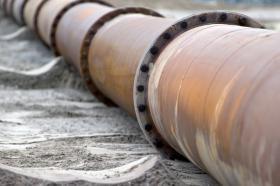Page 6
EPIB Trail
Volume 7, Issue 4
Water For Sale: Free of Charge By Derek Leckner Our lovely state of New Jersey is ranked number one in having the best percentage of students getting undergraduate degrees, is one of the most diverse states, and is home to some of the most bountiful farms in the nation. Yet, besides trying to catch the F or EE into Cook/Douglass or go from Cook/Douglass into Livingston, or from anywhere for that matter, one of the most serious issues the students of our state university has to worry about is getting clean water. In the 1700s, there was one beverage commonly drank by the New Jersey delegates and other founding fathers, and it wasn’t water. Water was considered poison. However, that was during a time before the invention of the light bulb and long before the first modern water treatment facilities. There shouldn’t be any excuses more than three hundred years and several trips to the moon later. Despite these human achievements, many people do not know that one of the most serious issues we face today, not only as Rutgers students, but also as one of the many college students across the country, may still be our lack of access to clean water. For many Rutgers students, we are told by our RAs that our dorm water is not the cleanest and our alternative use of plastic bottled water is not only killing our planet, but could also be contaminated as well. As of late, an organization called Food Water Watch has swept over Rutgers with the mission to educate and remedy this self-hydration issue. The Food Water Watch is an environmental group that supports the campaign called “Take Back the Tap.” The goal of the campaign is to raise money and support for the installation of water filters in all Rutgers University residence halls. These filters can insure students living and visiting on campus that the water they intake is clean and lacks any harmful chemicals. Furthermore, these filters are also water-refilling stations, as students are encouraged to use them to refill their non-plastic thermoses, NOT water bottles, as another part of the goal of these water filters is to make plastic bottles obsolete. These water filter stations are not a new concept, as many already exist in a variety of places in New Brunswick. Currently, these water filter stations are in every Rutgers student center from College Avenue to Busch. Unfortunately, the few that exist are not used that much, as many do not often visit their local student center or pass by the area where they are set up, making them less efficient at accomplishing their goals as they could be. With the lack of knowledge and quantity of these stations, water in the halls are still dirty and students continue to stock up on cases of non-recyclable water bottles whose chemicals slowly break down and taint your allegedly clean water. Thankfully, steps to make these water filter stations more prominent in Rutgers residence halls are alBack to Index

















